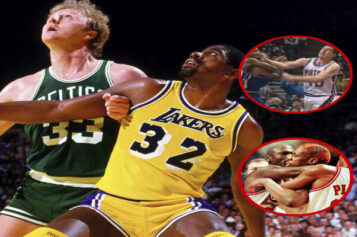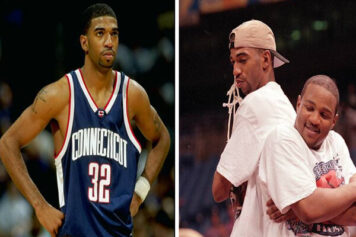THE LAW OF GUS
There are many scientific and philosophical laws that explain certain phenomena, like Newton’s laws of physics, or the laws of attraction and thermodynamics. To understand Johnson’s cultural significance within the sphere of sports and entertainment, proceed to the Urban Dictionary and look up The Law of Gus, which is defined as, “The law that states that whenever the excitable announcer is calling a college basketball or NFL game, something exciting will happen. It doesn’t matter if it’s during March Madness or during a meaningless game between Iowa Tech and the Milwaukee College of Art, the law is always in effect when Gus is present.”
In November of 2010, ESPN’s Bill Simmons summed it up more succinctly when he wrote, “I keep mentioning the Law of Gus without ever really defining it, so let’s do it now. If Gus Johnson is calling an NFL game, the odds quintuple that (A) the lead will change hands in the fourth quarter; (B) someone will complete a long pass in a big moment that will make Gus’ voice hit an octave that only dogs can hear; and (C) the game will go into overtime or at least come damned close. It seems impossible that the mere presence of an announcer would alter the course of the game, but here’s my theory: I think God sits in his man cave on Sundays and says, ‘Which game is that Gus Johnson calling? I get a kick out of that guy. I think I’ll make his game exciting and see if he completely loses his mind.’”
When Johnson hears that, a slight smile appears, but it’s out of genuine humility as opposed to self-absorbed satisfaction.
“I’m just humbled,” said Johnson. “I hearken back to my parents. I lost my mom on June 7th and my daddy died in June of 2009. They gave me so much. I was rich, wealthy in love and support. I’m happy to be a part of this industry. I’m happy to be able to delight in the excellence of these incredible athletes, these positive people, these kids who work hard, in the pros and in college. It’s just a wonderful blessing that I’ve been able to get to this point in my life and share all these great moments.”
An overlooked ingredient in the excitement that Johnson brings to those magical televised moments is the fact that he understands how difficult it is, how hard one has to work in order to achieve such magnificence on the biggest stages that sports has to offer.
He wasn’t some kid staring at the television trying to imitate the wordplay of Howard Cosell, John Madden, Marv Albert or Dick Vitale, dreaming about a career in sports broadcasting. In actuality, he spent his adolescent years taking his lumps outdoors, playing against some of the Detroit’s stiffest competition on the Motor City’s asphalt playgrounds and balding grass football fields, in neighborhoods that didn’t appear on city-approved postcards.
At Jesuit High School, he was an all-league team captain as a quarterback and defensive back on the football team and the Most Valuable Player as a guard on the basketball team. He was a star first baseman and catcher for the baseball team as well.
Among his AAU hoops teammates were Demetreus Gore, who would go on to be named Mr. Basketball in the state of Michigan before playing his college ball at the University of Pittsburgh, and Willie Burton, who starred at the University of Minnesota and played in the NBA with the Miami Heat, Philadelphia 76’ers, Atlanta Hawks, San Antonio Spurs and Charlotte Hornets.
Johnson was also not insulated from the consequences being experienced by his peers, especially the ones who veered off into dangerous directions.
“You’d go to Davison Park, and you knew that if you lost, you weren’t getting back on the court if it was a Saturday,” said Johnson. “They knew how to play. Those guys could really play. I’d play hard, all day. Athletics saved my life. I don’t know where I’d be without it. It was a refuge and salvation for me.”
“When you see a cat come to the court, take his gun out and unload it, you understand that there’s some danger in this world,” Johnson continued. “As a child, I said, ‘I gotta make sure that I put myself in a position to get outta here!’ I played ball and slept ball.”
PAYING HIS DUES
With the epiphany of his future broadcasting career having seeped into his bones and daily thought process, Johnson drove with his parents to Waco, Texas immediately upon his graduation from Howard University, where he started his first full-time job in television.
“When I got that job in Waco, at KXXV TV, I was the happiest human being in the world,” said Johnson. “I made $16,000 a year.”
As polished and comfortable as he is on camera today, his mastery of the craft, despite his excellent oratorical skills, was no natural gift. Nor was he lucky, unless you subscribe to the belief that luck is the residue of design and hard work. Gus paid his dues from day one.
“The thing about when you first start as a sportscaster, you have to do everything,” he said. “You have to shoot, you have to edit, you have to set up live shots, you have to write your own scripts. Sometimes, you even have to run your own teleprompter. It is not easy. They call it being a one-man band.”
Johnson’s hiring was somewhat controversial at KXXV because there was another candidate who already worked there who was more qualified on the technical side of the business. It was a source of contention for many who worked in the department.
The young man, upon realizing that Johnson was hired, marched into the boss’ office and demanded an explanation.
“He said, ‘How can you give this guy this job when I’ve been here as an intern and I do all of these things,’” Johnson recounted. “[My boss] said to him, ‘Look, I think you have a chance to be a good sportscaster one day. But that kid right there has a chance to be Bryant Gumbel. So that’s why I gave it to him.’”
Johnson initially struggled with the technical aspects of the job. No matter how hard he worked and applied himself, there were days where he felt himself drowning in quicksand.
“I was failing on the technical side,” said Johnson. “My editing wasn’t crisp. My shooting was off. I couldn’t follow the ball at a high school game. I just didn’t have the skill set.”
Once, when sitting in the editing bay with his boss, Johnson, the competitor who once played basketball on a Detroit playground that was littered with handguns a few steps from the sideline, broke down in tears.
“I said, ‘I’m failing,’” Johnson stated. “And he said, ‘OK, I’m glad you got to this point. I’m going to teach you how to idiot-proof everything. I’m going to teach you this business and once you get to CBS or wherever you go that’s Big Time, they will never be able to pull the wool over your eyes because you’ll know more than them, because you did it.”
“After a year of staying down there, everything changed,” Johnson continued. “I got my confidence.”
His next job took him to Huntsville, Alabama, at a station that had the Confederate flag prominently displayed on the morning show set.
The station’s weather man was growing a garden nearby, and there was a live shot of him showing off his okra, tomatoes, peas and other vegetables. As he talked about is garden, the guy said, “…but you know, the crows keep eating all my vegetables. Hey Gus, why don’t you come out here and be my scarecrow?”
Johnson’s father, who was in town visiting his son, saw the segment. When Gus returned home, his father wouldn’t look in his direction.
“My father was from Louisville, Kentucky, the segregated south,” said Johnson. “My mother was from Ackerman, Mississippi. He’s sitting there watching TV and said, ‘Son, you know I didn’t raise you…,’ and he wasn’t even looking at me, ‘…to allow anybody to emasculate you. You have a great home. You come from a great family. You come from a great university at Howard University. You don’t have to take that, OK?’”
Already simmering with what had happened earlier on the air, his father’s words spurred him out of his seat and into his car, where he drove back to the television station.
“I went back that day and cursed everybody out,” said Johnson. “I was ready to fight. I put my foot down. It was time. I had never experienced anything like that. But I’m a man, a young man, a developing man and it was time for me to establish boundaries for relationships with other human beings.”
Today, most people see the heights he’s attained in broadcast television, but they don’t know the back story, the struggle, the exhausting hours and tears that were shed along the way.
“It was hard,” said Johnson. “It was lonely. I was broke. I ate Del Taco, Whataburger and Jack in the Box every day.”
He went on to do local television in Greensboro, North Carolina and back in Washington D.C. before landing a gig at the Madison Square Garden network in 1994, where he did, among other things, play-by-play for the New York Knicks games on radio and TV.
Johnson’s work ethic and resume are beyond impressive, having done play-by-play for Big East basketball on the Big East Network, college hoops for ESPN, play-by-play for the MLB’s Detroit Tigers and the NBA’s Minnesota Timberwolves on the Midwest Sports Channel, play-by-play for the Canadian Football League and for the Detroit Lions.
He’s done NFL games for CBS, but his resonant work there was with the NCAA Men’s Basketball Tournament, where his most memorable calls are still recited with reverence by fans of his work and captured for posterity on YouTube.
As if that wasn’t enough, he’s also done boxing and mixed martial arts for Showtime along with voiceover work for EA Sports’ popular video games NCAA Basketball and Madden NFL franchises.
Have you seen the Buffalo Wild Wings commercial where the televised football game in the sports bar is manipulated to go into overtime so patrons can stay longer? Guess who the excitable announcer saying, “We’re heading to overtime!” is.
In May of 2011, Johnson left CBS for Fox Sports’ college football and basketball coverage.
It was a move that saddened many fans of March Madness. Despite CBS and Turner Broadcasting’s partnership with airing the NCAA Tournament, Gus Johnson fans are still holding out hope that he will one day return to provide play-by-play during America’s greatest sporting spectacle.
“I want to write my congressman to have him introduce a bill and make it a law to have Gus Johnson back working the NCAA Tournament,” said entrepreneur, basketball fan and Maryland native Mark D. Ball. “I would watch that guy announcing paint dry. Now that he’s at Fox and doing basketball games for the Big Ten Network, I’ve had to adjust my schedule accordingly. It’s amazing how much he adds to a game.”
Shortly after arriving at Fox, Johnson was asked by Fox Sports President Eric Shanks to become the voice of its soccer coverage, as the network had recently acquired the rights to the 2018 and 2022 World Cups.
“I had to learn the world game from scratch,” said Johnson. “My boss said, ‘You’re going to do this. You’re going to take some hits. But once you learn, we think we’ll have something special. We spent $450 million to obtain the rights to this tournament, the World Cup, and we want an American sound.’”
Johnson fastidiously went to work and immersed himself in the game. There were days when he couldn’t sleep as his inner voice moaned, “It’s gonna be painful. They’re gonna criticize me. I’m gonna make mistakes. I don’t know it. I’m not gonna be comfortable.”
“But there was something in the back of my mind, and I remember when my mom said, ‘You always gotta be good on your feet. You can’t be afraid of anything. Get in there and make that speech. Make it happen!'” said Johnson. “So I think about her and I think about being a black man. And a multi-national company comes to a black man, from the west side of Detroit and the son of a maintenance man and facilities worker, and they say, ‘Would you be our voice for the world?’”
“So I said, ‘What better opportunity than to take on something new, learn it, fight through it, go through the pain of it and hopefully, on the back side, become successful at it,” Johnson continued.
On Sunday, Johnson announced that he was stepping down as Fox Sports’ lead soccer broadcaster in order to concentrate on his family and his extensive college basketball and football duties at the network. With his myriad responsibilities and upcoming wedding, he did not feel that he could invest the necessary time and energy to perform at the level of excellence that he expects of himself.
“I want to hang out with my wife and that is where I’m at,” Johnson recently told Sports Illustrated. “I don’t want to be exhausted, tired and unprepared. What I realized about calling soccer, and especially international soccer, I needed to do 35-40 games just to get my bars up and my chops going. Because of my schedule, I never had a chance to get that kind of experience and work in. I always felt like I was cramming, and I don’t think that’s a good thing. If I am not the best I can be, I did not think it was something I should continue to do.”
“Gus fell in love with soccer, and it changed his life spending time in Europe,” Fox Sports President Eric Shanks told SI. “It was really hard because we both believe given the fair opportunity to immerse himself into it completely, we would have stuck with it. We could not do that for him schedule-wise, so this is the best result.”
“The job was the greatest experience of my professional life,” Johnson told SI. “Having the chance to travel the world and see things and countries I had never seen before, calling the biggest games in the world, two Champions League finals, it was something that I will never forget. It was a wonderful experience and I can’t thank Fox enough.”
Johnson’s radiant smile and incandescent on-air personality hide the fact that he is extremely competitive and yearns to be the best at any endeavor he commits to.
“I want to win at everything,” he said. “I think if I felt like it, if I concentrated enough, I think I could jump, touch the moon and rip down some stars.”
He’ll continue to take risks, stand firm behind his principles and augment his telecasts in ways that bring smiles and enjoyment to many. He can’t help it. It’s simply the way his mother and father raised him.
“My mother and father always told me that you have to always continue to grow,” said Johnson. “You can’t rest on your laurels and say, ‘OK, I made it.’ You have to stretch yourself, you have to improve your mind. When you improve your mind, you try to improve your spirit, you try to go out there and do as much as you can to have a complete life.”
“I haven’t always been successful,” he continued. “But at the same time, I’ve been fulfilled.”



